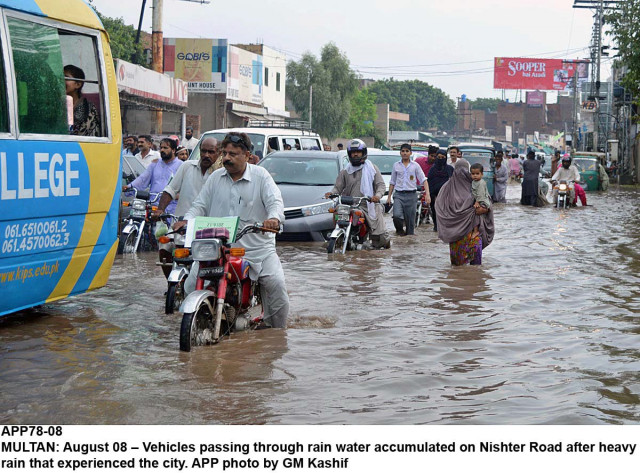Experts warn of disease emerging from monsoon rains
Medics say measures are necessary to avoid cold, flu, malaria or gastroenteritis

PHOTO: APP
“People indulge in eating a lot of junk food and frolic in the rain for fun. These are key factors in contracting such diseases,” says Salman Kazmi, a senior medic at Mayo Hospital.
Viral disease: Is Lahore at risk of Chikungunya?
He adds that the rainy season has truly arrived and it provides the perfect breeding ground for germs and bacteria which can lead to waterborne diseases that affect a lot of people. “In our hospital, health problems such gastroenteritis and malaria are on the rise,” he points out.
He says cholera, typhoid, hepatitis A, diarrhoea Malaria, dengue and haemorrhagic fever are some of the ailments that can affect the local population.
The doctor stresses that due to exposure to rain, hypothermia, respiratory tract infections and leptospirosis may affect people, while sudden drops in temperature harm the health of those with allergies or asthma.
He said those in close contact with animals or dirty water are also at high risk. Talking about diarrhoea, Dr Salman says the condition can result from viral infections, bacterial infections, or parasitic infestations.
“These pathogens typically reach the large intestine after the ingestion of contaminated food or water, oral contact with contaminated objects or hands, and so on,” he says.
Precautionary steps
Dr Salman Kazmi says things can be managed through oral rehydration therapy. “If this treatment cannot be adequately maintained due to vomiting or severe diarrhea, hospital admission may be required for intravenous fluid replacement.”
Talking about malaria, he says the mosquito-borne disease is caused by a parasite and people often experience fever, chills, and flu-like illness. Left untreated, it may develop severe complications and even cause death,” he underlines.
He further says dengue fever, transmitted to people by mosquitoes, results in skin rash, body pain, headaches as well as severe muscle and joint pains. Chikungunya, the doctor adds, is transmitted in the same manner as dengue fever and causes an acute febrile phase which lasts for two to five days. This is followed by a longer period of joint pains in the extremities and the discomfort can last for years in some cases.
“People must use anti-mosquito spray inside and outside their homes, while not allowing water to remain stagnant at homes,” he advises.
Four doctors contract chickenpox at Mayo Hospital
A health department spokesman tells The Express Tribune that the government has already prepared a contingency plan to cure people who have fallen victim to water and vector-borne diseases. “All medicines are already available at public hospitals.” He also stresses that people need to be aware of the hazards associated with rain-related diseases. “In the last monsoon season, there were several cases of gastro and malaria etc,” he recalls.
He adds people must take care of themselves by ensuring clean surroundings and by drinking boiled or filtered water. He also emphasised the importance of mosquito sprays and to avoid food from roadside eateries. “Otherwise, we are at the hospitals to treat them,” he sighs.
Published in The Express Tribune, July 3rd, 2017.



















COMMENTS
Comments are moderated and generally will be posted if they are on-topic and not abusive.
For more information, please see our Comments FAQ